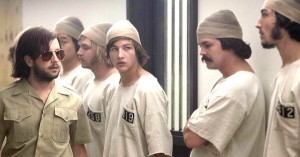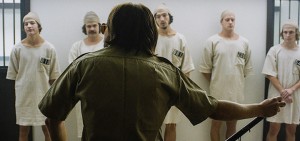 In 1971 at Stanford University, psychology professor Philip Zimbardo set up a 2 week experiment wherein Stanford students were recruited and paid $15 a day to either be a prisoner, or a prison guard. This ‘experiment’ was aimed to find whether inherent personality traits of prisoners or guards are the primary cause of the abusive behaviour that happens in prisons. The students were screened to exclude those with criminal backgrounds, questionable mental health, or medical problems. They were all deemed stable. Prisoners and guards were established by the flip of a coin.
In 1971 at Stanford University, psychology professor Philip Zimbardo set up a 2 week experiment wherein Stanford students were recruited and paid $15 a day to either be a prisoner, or a prison guard. This ‘experiment’ was aimed to find whether inherent personality traits of prisoners or guards are the primary cause of the abusive behaviour that happens in prisons. The students were screened to exclude those with criminal backgrounds, questionable mental health, or medical problems. They were all deemed stable. Prisoners and guards were established by the flip of a coin.
Professor Zimbardo designed the experiment in order to maximize the depersonalization of participants – prisoners wore sac dresses and caps; guards wore uniforms and sunglasses. He imposed one rule: there was to be no physical assault of the prisoners. Very quickly, however, the participants’ behaviours exceeded beyond what Zimbardo could have imagined. Within hours, those in the role of guard were enforcing authoritarian rules to such an extent that some prisoners were subjected to psychological torture. The prisoners, disoriented, mostly passively accepted the abuse, and could be induced to taunt those that didn’t.
After just 36 hours, one ‘prisoner’ had to be released due to increasingly erratic behaviour. Fully  a third of the ‘guards’ exhibited sadistic behaviour to the ‘prisoners’ who, keep in mind, were student volunteers just like themselves. They stripped them, degraded them, exerted them, bullied them, disturbed their sleep. It became an exercise in cruelty that the professor, reluctant to look away from his precious and costly little experiment, was forced to call off after just 6 days.
a third of the ‘guards’ exhibited sadistic behaviour to the ‘prisoners’ who, keep in mind, were student volunteers just like themselves. They stripped them, degraded them, exerted them, bullied them, disturbed their sleep. It became an exercise in cruelty that the professor, reluctant to look away from his precious and costly little experiment, was forced to call off after just 6 days.
As a student of psychology, I poured over this data and watched a lot of the footage, fascinated and horrified. We don’t just study this in behavioural psychology, we also study it in ethics. Why? This ‘study’ would not pass muster today, not by a long shot, not by 87 prison yards stacked back to back. Zimbardo was not much of a scientist or researchers. The MOMENT his ‘experiment’ (and you see by my quotations how I long not to call it that) veered away from predicted boundaries and went straight toward DANGEROUS situations, he should have hit the brakes. Instead, he put kids in psychologically damaging situations. Kids who were making $15 a day and didn’t fully understand that they could walk away. FIVE of eighteen had to be removed early because of emotional trauma – and I remind you this lasted only 6 of the 14 intended days.
DANGEROUS situations, he should have hit the brakes. Instead, he put kids in psychologically damaging situations. Kids who were making $15 a day and didn’t fully understand that they could walk away. FIVE of eighteen had to be removed early because of emotional trauma – and I remind you this lasted only 6 of the 14 intended days.
Luckily a grad student convinced Zimbardo that not only was he passively allowing these unethical acts (and HELLO – as psychologists, we’re supposed to HEAL not damage!), but that he himself had become absorbed by his role as the “superintendent” of the prison. He had lost all objectivity. This whole experiment was a waste – because he could not remain neutral, any  observations that we can make are subjective and anecdotal at best (let alone impossible to reproduce!).
observations that we can make are subjective and anecdotal at best (let alone impossible to reproduce!).
If this sounds too crazy to be true, well, I wish that was so. This wouldn’t be allowed to happen on a University campus anymore, but it sure as hell feels familiar if you look over what happened at Abu Ghraib with fresh eyes. If it sounds kind of like a movie, well, now it is.
It stars Billy Crudup (Big Fish) as the famed professor, Nelson Ellis (True Blood’s Lafayette) as an ex-con consultant, and a bunch of young men as the students: Ezra Miller (Trainwreck) as prisoner 8612, Tye Sheridan (The Tree of Life) as 819 and Thomas Mann (Me and Earl and the Dying Girl) as 416.
The movie, thankfully well-acted, is chilling, troubling, and thought-provoking. The cruelty is  relentlessly one-note, so if you watch it, you’re going to want to pencil in some debriefing\discussing\come-down time immediately after, because the saddest part about it is that 45 years later, it’s just as relevant.
relentlessly one-note, so if you watch it, you’re going to want to pencil in some debriefing\discussing\come-down time immediately after, because the saddest part about it is that 45 years later, it’s just as relevant.

So intrigued by this film! It’s definitely high on the watchlist
LikeLike
Sooooooo keen on this one – it needs to get to Australia stat!!!
LikeLike
Yes, we were lucky to catch it at our local art house theatre, not an easy one to come by!
LikeLike
I learned about this one in psych too. Interested to see how the movie turned out.
LikeLike
Yeah, you should check it out. If you’re familiar with it, you’ll probably recognize some aspects since it’s pretty faithfully recreated.
LikeLiked by 1 person
I’m really torn by being intrigued and afraid to watch this one. The “experiment” has fascinated me ever since I learned about it in a high school intro to psychology class, but I don’t know if I could stand to watch it. I’ve seen some of the video footage and that was hard enough.
A few years before this the theater department of the college I went to tried something similar when they put on a production of Marat/Sade. Students who were “inmates” lived in the theater basement and were watched over by the “guards”. They weren’t allowed to bathe.
Each production was a test of endurance not just for the students but the audiences.
It was a project that was never repeated.
LikeLiked by 1 person
That sounds brutal.
This one is uncomfortable for sure, but doable.
LikeLike
This sounds intriguing, and scary how quickly power (real or perceived) can transform a personality.
LikeLiked by 1 person
Yes, exactly. They used to believe it was pre-existing flaws in personality that led to this brutality but now it seems that the very nature of the position (whether empowered, or powerless) seems to bring out those scary sides of us.
LikeLike
I haven’t seen this one yet, its definitely new to me. I think theres a contemporary version of something like this. The so called guards and prisoners who survive get big cheques for their experiment.
LikeLike
I never heard of this experiment before. It sounds totally crazy! Strange way how the human mind works, after all, it was kind of a game but they played the parts seriously. Imagine if they had chosen the unstable or the ones with criminal records!!
LikeLike
I know. It was definitely a shock to the researchers. I think it should make us all a little nervous!
LikeLiked by 1 person
I wonder how all the ‘guards’ and ‘prisoners’ felt further on in life, and how it affected what they did with their lives.
LikeLike
Dave Eshelman, the most abusive guard, sounds a little callous and remorseless in this recent interview:
What came over me was not an accident. It was planned. I set out with a definite plan in mind, to try to force the action, force something to happen, so that the researchers would have something to work with. After all, what could they possibly learn from guys sitting around like it was a country club? So I consciously created this persona. I was in all kinds of drama productions in high school and college. It was something I was very familiar with: to take on another personality before you step out on the stage. I was kind of running my own experiment in there, by saying, “How far can I push these things and how much abuse will these people take before they say, ‘knock it off?’” But the other guards didn’t stop me. They seemed to join in. They were taking my lead. Not a single guard said, “I don’t think we should do this.”
The fact that I ramped up the intimidation and the mental abuse without any real sense as to whether I was hurting anybody— I definitely regret that. But in the long run, no one suffered any lasting damage. When the Abu Ghraib scandal broke, my first reaction was, this is so familiar to me. I knew exactly what was going on. I could picture myself in the middle of that and watching it spin out of control. When you have little or no supervision as to what you’re doing, and no one steps in and says, “Hey, you can’t do this”—things just keep escalating. You think, how can we top what we did yesterday? How do we do something even more outrageous? I felt a deep sense of familiarity with that whole situation.
LikeLiked by 1 person
I remember watching this in my college psych class, and being absolutely horrified. As far as it’s relevance, the original experiment was part of last night’s “Castle” episode. In it, a similar experiment was being carried out by a professor so the U.S. Military could understand the effects of imprisonment and interrogation techniques on college age terror suspects.
LikeLike
This is definitely frightening, Jay. Real research case study proving we all have problems in taking our “roles ” too seriously in life. On a lighter side of this “coin” in education classes (and many outside them may have heard of this study) if a teacher thinks her students are “gifted” even while average or below, she or he will successfully treat the students better and raise their test scores to above average. If the reverse happens, sometimes intermittent results in that some gifted students lower their,tests but still stay fairly high while others may drop. The roles and labels in these indicate how our minds carry out them. I won’t probably see this film because I get uncomfortable with unnecessary force. The movie where Terence Howard and Hugh Jackman torture a man to find their kidnapped daughter’s upset me for days, Jay.
LikeLike
Yes I can see how it would.
LikeLike
This sounds very intriguing to watch.
LikeLike
I will have to see this even though I know I will be disturbed by it. That Eshelman sounds like a real tool.
LikeLike
Yes, he really does!!!
LikeLike
Actually, I watched Castle on Monday(yes,…yes I did) and it centred around this exact experiment. I am not surprised because we do see this every day especially when people are in a position of power. It may not be to this extreme but this is why bullying still exists and will continue to exist. Remember, until Communism fell, there were people who were taken in the middle of the day or night because they represented a threat and they were often “told on” by neighbours, so-called friends or family. A friend of mine, during university days, went for 4 months to Moscow to study and I warned him. He thought I was overreacting. When he came back he told me of how terrified he was. Once, around 1am, he heard commotion in the stairwell of where he was staying. he opened the door to see what was going on and a kindly old lady across the hall told him to close the door. He did but watched as the secret police went one floor above and took a man away. he never heard of him again and no one spoke about it.
LikeLike
Power with no accountability means corruption, every time.
I don’t watch Castle but I do believe Veronica Mars also did an episode way back when…
LikeLike
This looks really interesting, I’ve been meaning to check it out. It sounds like The Experiment with Adrien Brody. Did you see that one? This one looks like it is better version but you’re right about the it being thought provoking. Great review!
LikeLike
I don’t think I saw that one, no.
This one’s a recreation of the real experiment.
LikeLiked by 1 person
Very disturbing, but I’m heartened by the fact that two thirds of the ‘guards’ didn’t go apeshit.
LikeLike
Yes, but they did stand passively by, and never questioned any of the brutality, or intervened. So not much better.
LikeLike
😦
LikeLiked by 1 person
Great review! I’ve had this on my must see list since it premiered at Sundance. I’m hoping I can see it soon. I hope that limited theater release it got in March wasn’t it. I’d like to see it come back.
LikeLike
Well we just got it here, so I guess there’s hope!
IMDB lists its american release date as Sept 18 2015 so I guess they’re just rolling it out officially now.
LikeLike
Have you heard of The Experiment with Adrian Brody? It was straight to video few years back based on this event. The movie was okay, but this film here has intrigued me more. And thanks for the background, i know more now than i did before.
LikeLike
Have you heard of The Experiment with Adrian Brody? Its based on the same event and was released a few years back straight to video. The movie was okay, but this has really intrigued me. And thanks for the background, i like reviews with some knowledge to it so i can learn something lol
LikeLike
Great write-up, can’t wait to watch this. I found this so fascinating when learning about Zimbardo’s crazy antics at university. Such an unethical menace! He’s an interesting guy though.
LikeLiked by 1 person
Yes, thank you! A total menace. He needed to have his license revoked. Today they would have sued his ass off, and he deserved it.
LikeLike
Interesting debate on ethics. This experiment reveals the nature of man… Unfortunately. I haven’t seen this version, but I remember Das Experiment rather well. I’m looking forward to this cast, especially more from Sheridan and Miller. Thanks for this compelling review.
LikeLike
Yeah, I like Miller in everything I see him in.
LikeLiked by 1 person
That Tilda Swinton movie, We Need to Talk About Kevin, with Ezra as deranged son was awesome. Artsy cinema done right.
LikeLike
Pingback: NHFF: | Assholes Watching Movies
Pingback: Experimenter | Assholes Watching Movies
Pingback: The Preppie Connection | Assholes Watching Movies
Pingback: Top 10 Actors Who Play Assholes | ASSHOLES WATCHING MOVIES